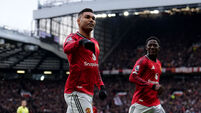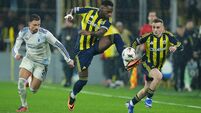Fleeting flash of Samba magic is enough
Forty-four minutes had elapsed in Berlin last night before Brazil finally did that thing they do so well.
Up to that point they had been well contained by Croatia, the full samba production we’d been expecting more or less confined to edited highlights: a Roberto Carlos rocket tipped over his bar by Stipe Pletikosi, some fine work from the ever-inventive Kaka, and the odd flash of ball juggling wizardry from Ronaldinho.














